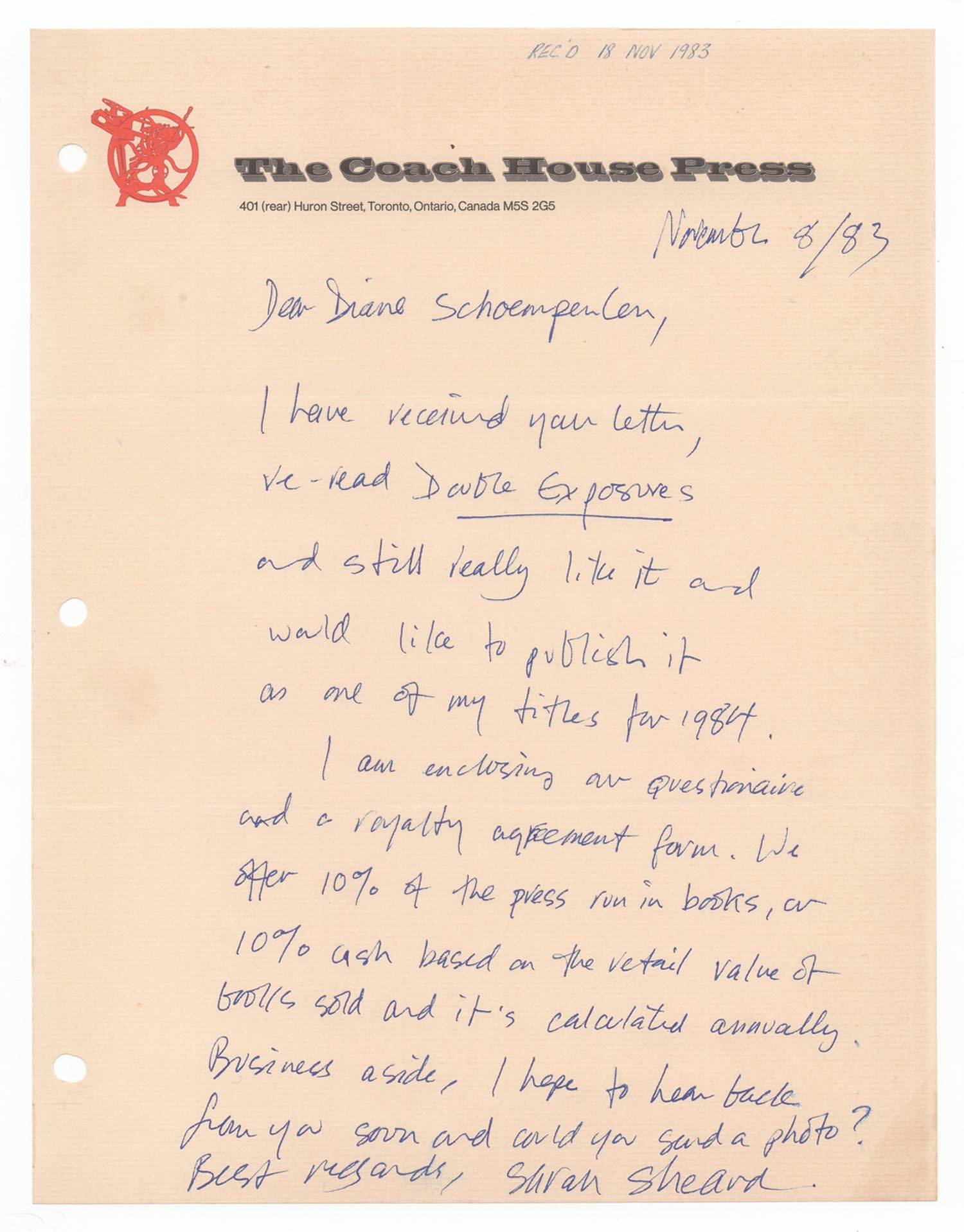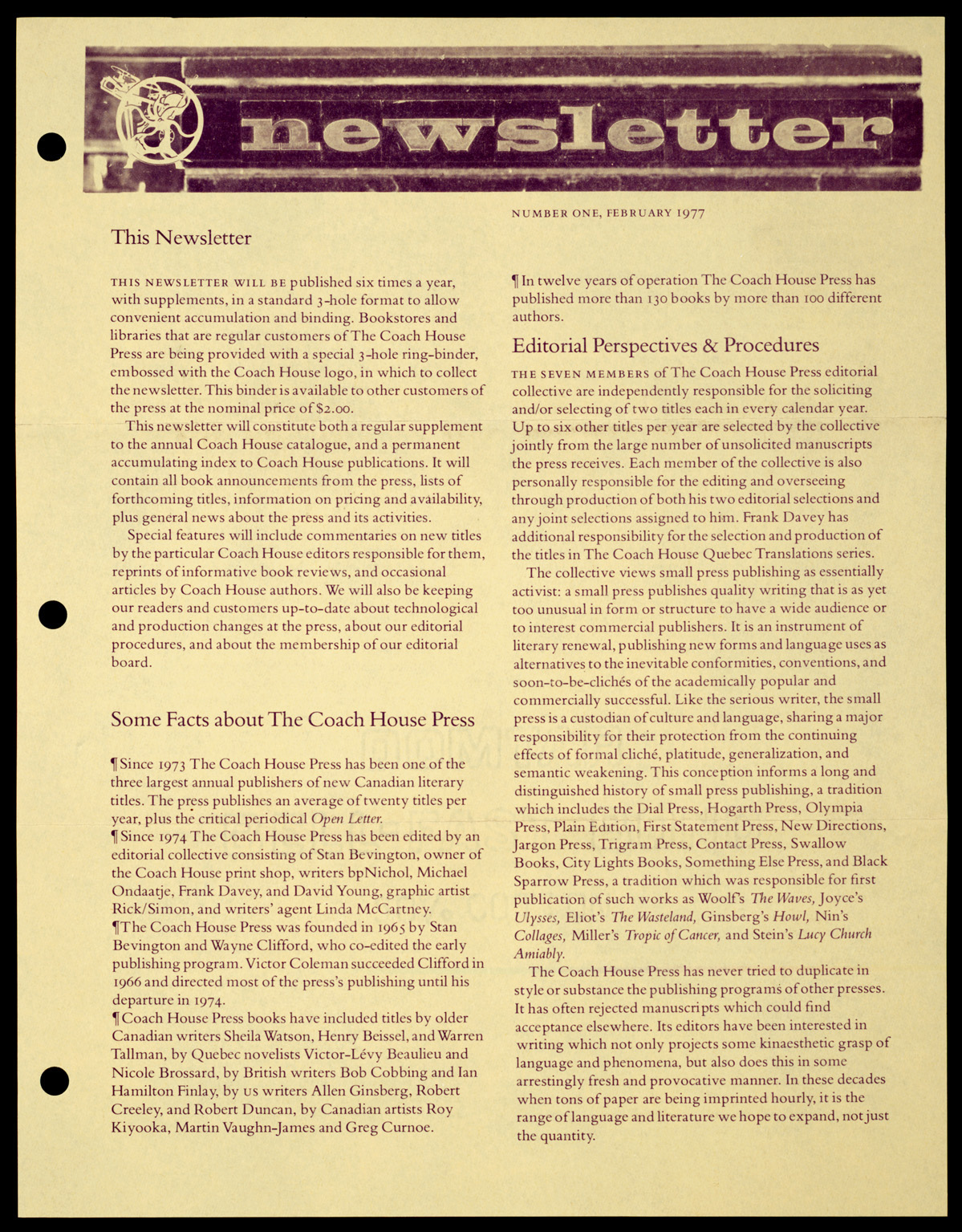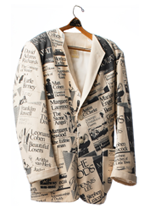A Concise History and Video Tour of Coach House Press
Sarah Hipworth, Toronto

Coach House Press, an independent printing and publishing house, was founded in 1965 in an old coach house off Bathurst Street in downtown Toronto. The space served as studio, home, and print shop to Stan Bevington, master printer and founding publisher. Writers and creative collaborators would visit Coach House, and in February 1965, Bevington and colleague Dennis Reid published Wayne Clifford’s Man in a Window, the first official Coach House book. From the outset, Coach House welcomed touring and local poets, artists, and photographers, and early Coach House titles were unique combinations of poetic and graphic imagery.
At a literary soirée hosted by poet Earle Birney, Bevington met Victor Coleman, an influential poet who would become editor of Coach House Press from 1966 to 1974. In 1967, the Coach House motto, “Printed in Canada on Canadian paper by mindless acid freaks,” began appearing on assorted ephemera in Toronto, and in spring 1968, the press moved to its current home in a laneway off Huron Street, since named after the “patron saint” of Coach House Press, poet bpNichol.
During the early 1970s, limited equipment restricted what Coach House could publish. Eventually, they acquired more presses, and technological innovations  allowed them to move into typesetting fiction and other books that contained a substantial amount of text. In 1974, Coleman stepped aside as editor and invited an editorial board of senior Coach House authors and staff members to choose what books would be published.
allowed them to move into typesetting fiction and other books that contained a substantial amount of text. In 1974, Coleman stepped aside as editor and invited an editorial board of senior Coach House authors and staff members to choose what books would be published.
In 1987, the publishing arm of Coach House Press was sold to the editorial board. Coach House was split into two divisions: one company whose financial papers looked like most other Canadian publishers (thereby giving Coach House access to government funding) and another that was the printing company. The publishing side of the business was reorganized to be more mainstream and profitable; the printing side was already robust, having printed,  throughout most of its existence, posters for theatre groups and art galleries, the works of other small publishing clients, software manuals, and a large number of books.
throughout most of its existence, posters for theatre groups and art galleries, the works of other small publishing clients, software manuals, and a large number of books.
The two divisions further separated when the editorial board hired a manager who wanted to print the company’s books elsewhere. Around that time, the Ontario government cut funding to publishing enterprises, and in 1996, Coach House the publishing company was dissolved. All copyrights were returned to their authors.
Stan Bevington reunited with Victor Coleman and designer Rick/Simon, and in 1997 reinvented Coach House Books as a publishing house that provided books in print format and in free online editions. By year’s end, they had published fourteen texts of poetry, experimental fiction, artist books, and drama, thus becoming the world’s first publisher of full-text online books of poetry and fiction. They continued to publish full texts online for five years.
Since then, Coach House Press has returned to publishing finely crafted books. The printing and publishing arms are separate but interconnected. Coach House continues to be known as “a haven for the avant-garde and the anarchic, and a repository of revolutionary inclinations and ideas.”
“A Rogues’ Gallery of the Canadian Book and Printing Arts: Stan Bevington.” DA 57 (Fall Winter 2005).
MacSkimming, Roy. The Perilous Trade: Publishing Canada’s Writers. Toronto: McClelland & Stewart, 2003.
“Echoes Without Saying.” Directed by Ron Mann. Toronto: Sphinx Productions, 1983. Filmstrip.
“A Magical Mystery Tour: Inside the Coach House Press.” Pamphlet to accompany guided tours through Coach House Press. [n.d.]
Coach House Press papers, Thomas Fisher Rare Book Library, University of Toronto
Coach House Press fonds, Library and Archives Canada















